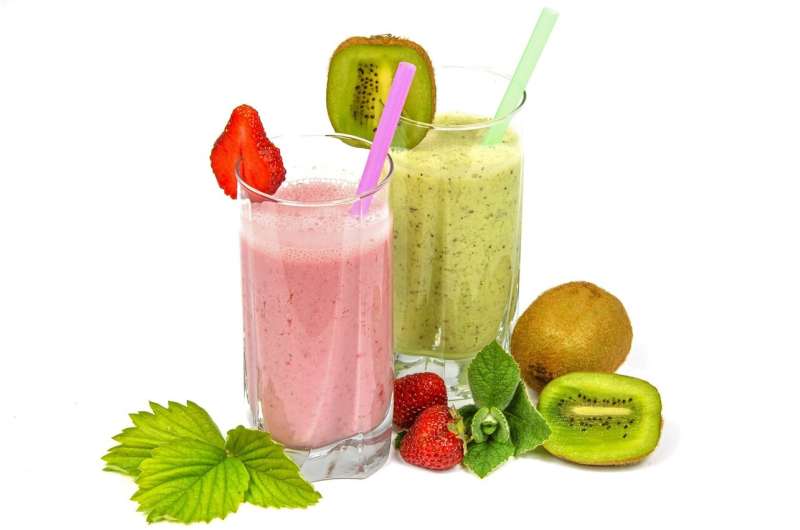This article has been reviewed according to Science X's editorial process and policies. Editors have highlighted the following attributes while ensuring the content's credibility:
fact-checked
trusted source
proofread
Getting the most health benefits from fruit smoothies: Researchers find adding a banana decreases level of flavanols

Smoothies can be a tasty and convenient way to get the important fruits and vegetables you need for a healthy diet. But is a banana and blueberry smoothie the best combo? Researchers at the University of California, Davis, suggest that blending certain ingredients in smoothies can influence whether your body is getting a nutritional boost.
The study, published today in Food and Function, used smoothies to test how various levels of polyphenol oxidase, an enzyme in many fruits and vegetables, affects the levels of flavanols in food to be absorbed by the body. Flavanols are a group of bioactive compounds that are good for your heart and cognitive health and are naturally found in apples, pears, blueberries, blackberries, grapes and cocoa—common smoothie ingredients.
"We sought to understand, on a very practical level, how a common food and food preparation like a banana-based smoothie could affect the availability of flavanols to be absorbed after intake," said lead author Javier Ottaviani, director of the Core Laboratory of Mars Edge, which is part of Mars, Inc., and an adjunct researcher with the UC Davis Department of Nutrition.
Slice an apple or peel a banana and the fruit will quickly turn brown. That happens because of polyphenol oxidase, or PPO, an enzyme naturally present in those foods. The browning occurs when the food containing that enzyme is exposed to air, cut or bruised. The researchers wanted to know whether consuming freshly prepared smoothies made with different PPO-containing fruits impacted the amount of flavanols available to the body.
Bananas versus berries
The researchers had participants drink a smoothie made with banana, which has naturally high PPO activity, and a smoothie made with mixed berries, which have naturally low PPO activity. Participants also took a flavanol capsule as a control. Blood and urine samples were analyzed to measure the level of flavanols present in the body after ingesting the smoothie samples and capsule. The researchers found that those who drank the banana smoothie had 84% lower levels of flavanols in their body compared to the control.
"We were really surprised to see how quickly adding a single banana decreased the level of flavanols in the smoothie and the levels of flavanol absorbed in the body," Ottaviani said. "This highlights how food preparation and combinations can affect the absorption of dietary compounds in foods."
Last year, the Academy of Nutrition and Dietetics issued a dietary recommendation, advising people to consume 400 to 600 milligrams of flavanols daily for cardiometabolic health. Ottaviani said for people who are trying to consume those flavanols, they should consider preparing smoothies by combining flavanol-rich fruits like berries with other ingredients that also have a low PPO activity like pineapple, oranges, mango or yogurt.
He also said bananas remain a great fruit to be eaten or consumed in smoothies. For those who want to consume smoothies with bananas, or other high PPO activity fruits and vegetables such as beet greens, the suggestion is to not combine them with flavanol-rich fruits such as berries, grapes and cocoa.
The findings of this study could spur future research into how other foods are prepared and the effects on flavanols, for example, Ottaviani said tea is a major dietary source of flavanols and depending on how it is prepared, a different amount of flavanols would be available for absorption.
"This is certainly an area that deserves more attention in the field of polyphenols and bioactive compounds in general," said Ottaviani.
Jodi Ensunsa, Reedmond Fong, Jennifer Kimball and Alan Crozier, all affiliated with the UC Davis Department of Nutrition and researchers affiliated with the UC Davis Department of Internal Medicine, University of Reading, King Saud University and Mars, Inc. contributed to the research.
More information: Javier I. Ottaviani et al, Impact of polyphenol oxidase on the bioavailability of flavan-3-ols in fruit smoothies: a controlled, single blinded, cross-over study, Food & Function (2023). DOI: 10.1039/D3FO01599H




















